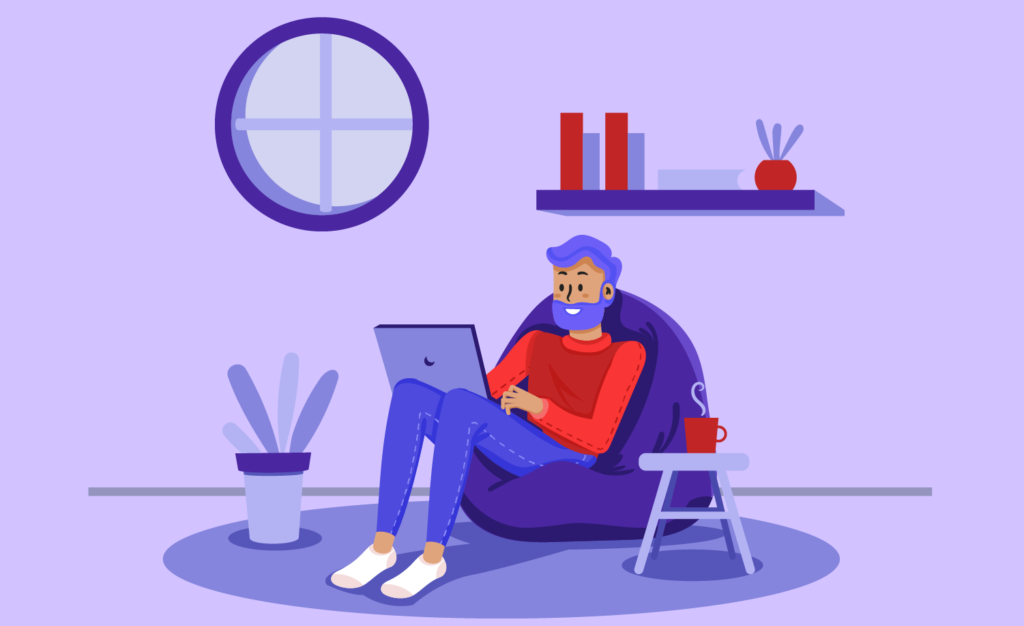Working from home or working remotely may seem like the goal when you are going to school. Thinking about waking up, rolling out of bed, and getting to work 10 feet from your bed can be the ideal situation. Not to mention having the ability to dress how you want and eat when you want. However, working remotely is not all it is made out to be, but it can be as long as you follow a few pretty easy steps to avoid remote work challenges and bad habits.
I am sure once you think about some bad habits with working from home or remotely we can all think of a similar few. These without a doubt are going to be the bad habits you need to avoid, but there is some habit you may not realize are bad. Some habits take weeks to build up and over the time of its building won’t affect you, but then the result will affect you drastically.
Prepare Yourself
First, you need to truly understand what your limits are, how you work best, and what kind of support system you need. All of these factors directly affect how you function and prevent yourself from burnout but also stay motivated. Some need to have some form of exercise in the morning, some need a full breakfast, and others (most) need a bucket of coffee. It is important to know what you need so that you can be prepared for each day.
Now many of you might be thinking, “how is this different from preparing to go to the office?” which is a very good question. The difference is if you don’t prepare correctly before going to the office, you have the office environment to motivate you to do your work. Whereas if you don’t prepare correctly to work from home, you have more distractions readily available, and it can be harder to get on track.
Be Mindful
On the other hand, there are some things you need to keep in mind to not do for another reason than productivity. Keeping your mental health is even more important. As it is your body, you can easily tell if something is wrong such as a fever or a cold. When it comes to your mind, it can be more difficult to tell until it has developed over a long period of time, and it is harder to combat then. When you are in the office, you can talk to others, and others can tell if there is something off, or you can tell by communication with others and how you feel. When working from home, it can be hard to see these signs or even chalk them up to normal. For instance, some of the downsides to working from home and that significantly affect your mental health include:
- Never taking breaks
- Getting little sleep
- Continuing to check your email or phone even after working hours
- Eating in front of your computer
- Not having the social aspect of work
- Agreeing to inconvenient times for calls
These are all things that we regularly do because we think it is expected. This makes for an unrealistic image of what work life is supposed to look like, and it will burn you out.
Daily Habits
Some daily habits may not be ones that are listed above. Some of these habits may be attempts in procrastination as you think you can get the work done later since you’re home all day anyway. I know I have been guilty of this. Doing something personal or another chore thinking, “I can do this after and work late, I’m home anyway.”
Some of these habits include:
- Doing dishes, laundry, starting dinner, etc.
- Holding yourself to the exceptionally high standard every day
- Some days will be extremely productive; some days will be a struggle. Allow yourself time to recharge and learn from those days.
- Not separating work from life
- Allowing your schedule to become too flexible
- Working ahead in the week in the evening and nights
These are all habits that will take a toll on your personal life, mental health, physical health, relationships, etc. It is important to maintain a healthy work-life balance and stay strict with that schedule.
Your Best Interest
We all want to perform to the best of our abilities at work and get noticed. This doesn’t mean working 24 hours a day and taking on more work than you can handle. This approach is only sustainable for a short period of time; then you will only burn yourself out. Then the quality of your work will drop and your productivity with it. In the long term, not taking care of yourself doesn’t just hurt you, but it hurts your business as well.
Making sure these bad habits (that seem like good habits at the start) do not continue is key to your success as a professional in the industry and keeps you driven to do more. You are no use (no offence) to yourself or your business if you have burnt yourself out and are struggling to keep up with your daily tasks, let alone extra work.
This can be a slippery slope to sleeping in later, not preparing for your day ahead, extending your workday as you are losing productivity and more. Everything you do today affects how you will perform tomorrow, next week, and next month. These effects are only amplified by working at home as you are solely in control of your productivity, and it is much easier to let it slip.
Tips To Staying On Track
Working from home can be everything you think it will be when you envision it in your head, but there are some steps to take to get there. Some tips are important for both working at home and going into the office as preparing for a successful day of work, chores, or a day of activities should all start similarly. Some of these tips are:
- Get started early
- Pretend like you are going to the office
- Have a dedicated workspace
- Work when you are most productive
- Plan out what you will be doing and when
- Use technology to stay connected
- Take clear breaks
- Interact with other humans
- Pick a definitive end time for your day
As you can see, many of these steps are useful for going into the office and working from home. But it doesn’t make them any less important. Structure is key to any successful day and it can take work to stay focused on it.
How To Start
Starting can be difficult, especially if you are coming from working in an office and transitioning to working from home. Structure is even more important when you are starting. Create an exaggerated plan and stick to it until you get into a routine and understand where your strengths and weaknesses are. Don’t be afraid to try new things and experiment; you never know if you will find a way of doing things you like better.
Working from home can be a blessing and a curse at times; it takes hard work to stay focused and on top of things every day. There are steps that you have to take each day and actively work towards. It can be hard to differentiate a home from the place you relax to the place you need to get work done. Hopefully, these habits outlined help you understand what to stay away from and something to work towards. Good luck, and enjoy it.
 Identify
Identify Personalize
Personalize Benchmark
Benchmark Agencies
Agencies Integrations
Integrations Case Studies
Case Studies Use Cases
Use Cases Blog
Blog Resources
Resources









